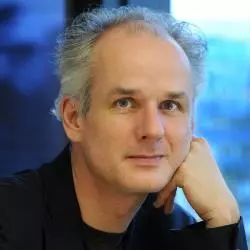
Nikolaus Rajewsky
USERN Advisory BoardNikolaus Rajewsky earned his M.A. and Ph.D. in Theoretical Physics at the University of Cologne, Germany (1997). After postdoctoral research at Rutgers University and Rockefeller University, he was an Assistant Professor for Biology and Mathematics in the Department of Biology at NYU (2003-2006), co-associated with the Courant Institute of Mathematical Sciences. He is now a full Professor at the Max Delbruck Center for Molecular Medicine in Berlin, Germany. He conceived and directs the Berlin Institute for Medical Systems Biology (BIMSB).
Dr. Rajewsky uses both computational and experimental molecular biology methods to study gene regulation in animals. A focus of his work is on small non-coding RNAs such as microRNAs. His latest awards include the IUBMB medal and the Anniversary price of the German Biochemistry Society. The new BIMSB received 12 million Euros in funding. Dr. Rajewsky’s research has been published and featured in numerous journals, including Nature, Science, Cell, Nature Genetics and Nature Biotechnology.
He showed that microRNAs, a recently discovered novel class of genes, regulate the expression of thousands of animal genes. He helped to elucidate microRNA function in pancreatic beta cells (insulin secretion), liver (cholesterol levels) and B cells (maturation). His demonstrated that microRNAs leave cell type specific mRNA expression signatures and that human genotyped polymorphism data can be used to explicitly quantify the contribution of microRNA targets to human fitness. He also developed methods to identify microRNAs from next generation sequencing methods. His latest paper (Nature2008) used novel quantitative high-throughput mass-spectometry to show that a human microRNA directly regulates protein synthesis of hundreds of genes.
Curriculum vitae
Since 2008 Scientific Director, BIMSB, MDC, Berlin
Since 2006 Full professor (W3) for Systems Biology, Charité (MDC), Berlin
2003 – 2006 Assistant professor, Department of Biology and Courant Institute for Mathematical Sciences, New York University (tenure track)
1999 – 2002 Postdoctoral fellow, The Rockefeller University, New York, US
1998 – 1999 Postdoctoral fellow, Rutgers University, New Brunswick, US
1995 – 1997 PhD in Theoretical Physics, Universität zu Köln
1994 – 1995 Diploma in Theoretical Physics, Universität zu Köln
Research fields
Our group combines theoretical/computational and experimental methods to understand gene regulation in animals with major focus on:
§ Post-transcriptional gene regulation by small RNAs (for example microRNAs) and RNA binding proteins
§ Interdisciplinary approaches employing techniques from molecular biology and biochemistry on different model organisms
§ Analysis with tools and concepts from bioinformatics, statistics, and physics
Activities in the scientific community, honors, awards
2017 Coordinator, Marie Skłodowska-Curie Innovative Training Networks, European Commission (3.5 million Euros)
2016, 2017 Visiting professor for research activities, Sapienza – University of Rome, IT
2014 Honorary PhD in Human Genetics and Medical Biology, Sapienza – University of Rome, IT
2013-2017 131 invited talks at international conferences
Since 2012 Member, advisory board ‘Wissenschaftskolleg Berlin’
2012 Gottfried Wilhelm Leibniz Prize, German Research Foundation (DFG)
Since 2010 Member, Science Advisory Board, Medical Research Council (MRC) Institute‘ London Clinical Sciences’, UK
2010 Member, European Molecular Biology Organization (EMBO)
2009 Berliner Wissenschaftspreis, presented by the Governing Mayor of Berlin
Since 2008 Global Distinguished Professor of Biology, New York University, US
2008 Initiator and founding director, BIMSB, institutionalized and supported by the Federal Ministry of Education and Research (BMBF), (ca. 20 million Euros p.a.)
2008 Awardee, Entrepreneurial Regions program, Federal Ministry of Education and Research (BMBF), (11.5 million Euros)
Selected publications
Piwecka M, Glazar P, Hernandez-Miranda LR, Memczak S, Wolf SA, Rybak-Wolf A, Filipchyk A, Klironomos F, Cerda Jara CA, Fenske P, Trimbuch T, Zywitza V, Plass M, Schreyer L, Ayoub S, Kocks C, Kuhn R, Rosenmund C, Birchmeier C, Rajewsky N. Loss of a mammalian circular RNA locus causes miRNA deregulation and affects brain function. Science 2017; 357:eaam8526
Karaiskos N, Wahle P, Alles J, Boltengagen A, Ayoub S, Kipar C, Kocks C, Rajewsky N*, Zinzen RP*. The Drosophila embryo at single-cell transcriptome resolution. Science 2017; 358:194-199 | *corresponding authors
Solana J, Irimia M, Ayoub S, Orejuela MR, Zywitza V, Jens M, Tapial J, Ray D, Morris Q, Hughes TR, Blencowe BJ, Rajewsky N. Conserved functional antagonism of CELF and MBNL proteins controls stem cell-specific alternative splicing in planarians. Elife 2016; 5: e16797
Rybak-Wolf A, Stottmeister C, Glazar P, Jens M, Pino N, Giusti S, Hanan M, Behm M, Bartok O, Ashwal-Fluss R, Herzog M, Schreyer L, Papavasileiou P, Ivanov A, Ohman M, Refojo D, Kadener S, Rajewsky N. Circular RNAs in the Mammalian Brain Are Highly Abundant, Conserved, and Dynamically Expressed. Mol Cell 2015; 58:870-885
Jens M, Rajewsky N. Competition between target sites of regulators shapes post-transcriptional gene regulation. Nat Rev Genet 2015; 16:113-126
Rybak-Wolf A, Jens M, Murakawa Y, Herzog M, Landthaler M, Rajewsky N. A variety of dicer substrates in human and C. elegans. Cell 2014; 159:1153-1167
Grun D, Kirchner M, Thierfelder N, Stoeckius M, Selbach M, Rajewsky N. Conservation of mRNA and protein expression during development of C. elegans. Cell Rep 2014; 6:565-577
Grosswendt S, Filipchyk A, Manzano M, Klironomos F, Schilling M, Herzog M, Gottwein E, Rajewsky N. Unambiguous identification of miRNA:target site interactions by different types of ligation reactions. Mol Cell 2014; 54:1042-1054
Ashwal-Fluss R, Meyer M, Pamudurti NR, Ivanov A, Bartok O, Hanan M, Evantal N, Memczak S, Rajewsky N*, Kadener S*. circRNA biogenesis competes with pre-mRNA splicing. Mol Cell 2014; 56:55-66 | *corresponding authors
Memczak S, Jens M, Elefsinioti A, Torti F, Krueger J, Rybak A, Maier L, Mackowiak SD, Gregersen LH, Munschauer M, Loewer A, Ziebold U, Landthaler M, Kocks C, le Noble F, Rajewsky N. Circular RNAs are a large class of animal RNAs with regulatory potency. Nature 2013; 495:333-338
No items yet!
No items yet!
No items yet!